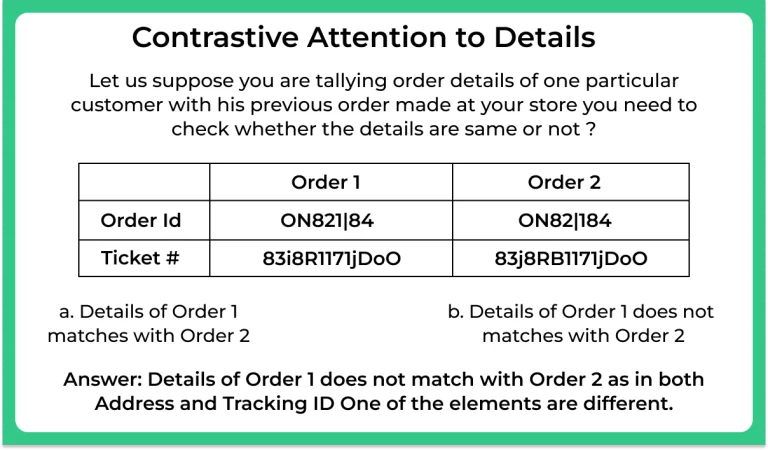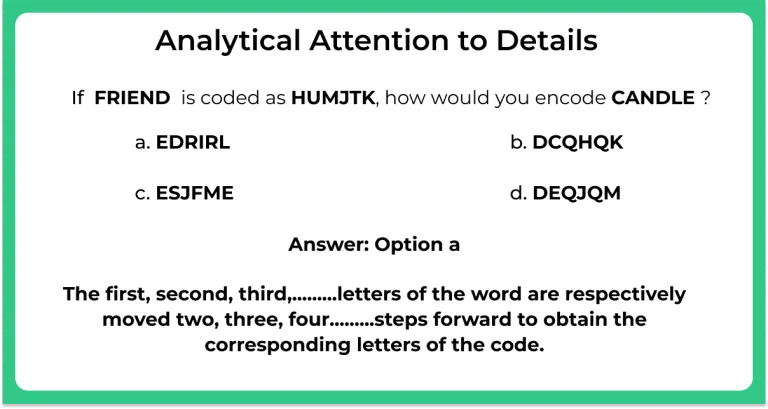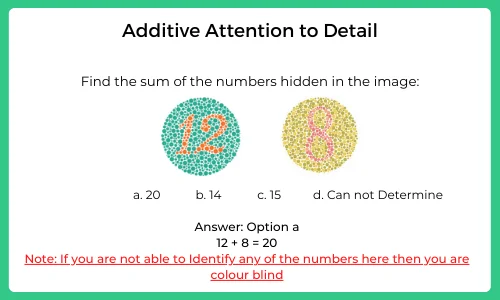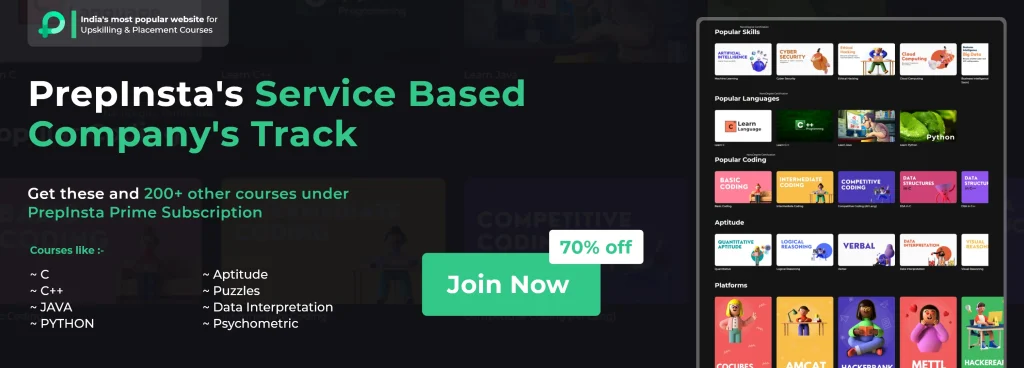Logical Menu
- Number Series
- Coding and Number Series
- Letter and Symbol Series
- Logical Sequence of Words
- Analogy and Classification Pattern
- Statements and Conclusions
- Statements and Assumptions
- Data Sufficiency
- Visual Reasoning
- Cube and Cuboid
- Cube
- Dice
- Directional Senses
- Blood Relations
- Odd Man Out
- Syllogism
- Arrangements
- Seating Arrangements
- Coding Deductive Logic
- Objective Reasoning
- Selection Decision Tables
- Attention to Details
- Inferred Meaning
- Cryprtarithmetic
- Get Off-campus Drive Updates
- Get Hiring Updates
- Contact US
PREPINSTA PRIME
Tips Tricks And Shortcuts For Attention To Details
Tips and Tricks and Shortcuts for Attention To Details Questions

Attention To Details Tips and Tricks and Shortcuts:
Here we have mentioned Tips and Tricks and Shortcuts for solving Text Based and Picture Based Attention to details:
Text-Based:
- Skim First: Quickly read through the passage or question stem to get a sense of the content and structure.
- Highlight Key Information: Identify and mark important details such as names, dates, numbers, and keywords.
- Eliminate Extreme Options: Cross out answers that contain extreme language or are obviously incorrect.
- Use Context Clues: Pay attention to the context of the passage to infer meanings of unfamiliar words or concepts.
- Focus on Comparisons: If the question involves comparing items, make sure to carefully evaluate the similarities and differences.
- Consider Repetition: If a detail is repeated throughout the text, it’s likely significant and deserves attention.
- Analyze Sentence Structure: Sometimes, the way a sentence is structured can provide clues about the correct answer.
Picture-Based:
- Observe the Image: Look at the entire image briefly to understand its contents and layout.
- Divide and Conquer: Mentally divide the image into sections and examine each part thoroughly before moving on.
- Notice Details: Focus on small elements like colors, shapes, sizes, positions, and any labels or captions.
- Identify Anomalies: Look for anything that seems out of place or doesn’t fit the overall theme of the image.
- Use Grid Method: Mentally overlay a grid on the image to ensure systematic coverage and attention to each section.
- Compare Objects: If there are multiple objects in the image, compare them to determine differences and similarities.
- Zoom In and Out: Mentally zoom in to see finer details and zoom out to grasp the overall composition.
- Think Chronologically: If the image depicts a sequence of events, analyze the order in which things are happening.
- Avoid Assumptions: Only consider what’s directly presented in the image; don’t assume additional information.
Prime Course Trailer
Related Banners
Get PrepInsta Prime & get Access to all 200+ courses offered by PrepInsta in One Subscription
Also Checkout

Type 1: Contrastive Attention To Details
Under contrastive attention, the questions will be asked to find out or compare known or given information. The main thing about contrastive types is they are objective in nature. Meaning the answer could be right or wrong or true or false types. Either you have to choose a right or a wrong answer from the given choices. Working with contrasting style is very helpful as this leads to zero error work.
Question 1.
Read the below-given information and answer whether column A is similar or dissimilar to column B?
Column A
Ph 33#847-718-9676
Column B
Ph 33#847-718-9676
A. Similar
B. Dissimilar
C. Not sufficient information
D. Cannot be determined
Answer: A
Explanation:
If we observe the question clearly, Columns A and B are exactly the same. Hence option A is correct.

Type 2: Analytical Attention To Details
Analytical attention to detail is related to finding out a solution to the problem. There may be multiple solutions to the problem and the correct answer may be particular in nature. Thorough knowledge of the subject is required to reach the correct answer in this type. In these types of questions, you may be asked to solve analytical problems by giving some samples along with some directions which will make the whole question different. First, you need to resolve the problem in a new series followed by a solution to the problem.
Question 2.
• If * stands for /
• / stands for –
• + stands for * and – stands for +
then 48/8*4+50-8
A. -10.66
B. -44
C. -1890.00%
D. -10633.33%
Answer: B
Explanation:
48-8/4*50+8
56-100= -44

Type 3: Additive Attention To Detail
Under this category, there may be endless solutions to a problem as it is all about improvement or advancement. These types of problems seem very difficult as it requires continues development. These problems may be related to the personality behavior of an individual or the performance of a man, machine, or related. Undoubtedly, it’s hard to generalize or to give a specific answer because it’s always about developing something new.
Question 3.
I enjoy doing work that is unpredictable.
A. Strongly Disagree
B. Disagree
C. Neutral
D. Agree
E. Strongly Agree
Answer: B
Explanation:
The above-mentioned problem is related to the like or dislike of an individual. It may vary as per individual beliefs. Hence it is difficult to generalize.
Also Checkout
Get over 200+ course One Subscription
Courses like AI/ML, Cloud Computing, Ethical Hacking, C, C++, Java, Python, DSA (All Languages), Competitive Coding (All Languages), TCS, Infosys, Wipro, Amazon, DBMS, SQL and others
- Coding Deductive Logic – Questions | Formulas | How to Solve Quickly | Tricks & Shortcuts
- Objective Reasoning – Questions | Formulas | How to Solve Quickly | Tricks & Shortcuts
- Selection Decision Tables – Questions | Formulas | How to Solve Quickly | Tricks & Shortcuts
- Inferred Meaning – Questions | Formulas | How to Solve Quickly | Tricks & Shortcuts
- Coding Deductive Logic – Questions |
Formulas |
How to Solve Quickly |
Tricks & Shortcuts - Objective Reasoning – Questions |
Formulas |
How to Solve Quickly |
Tricks & Shortcuts - Selection Decision Tables – Questions |
Formulas |
How to Solve Quickly |
Tricks & Shortcuts - Inferred Meaning – Questions |
Formulas |
How to Solve Quickly |
Tricks & Shortcuts

 Apply For Jobs
Apply For Jobs Get Hiring Updates
Get Hiring Updates



